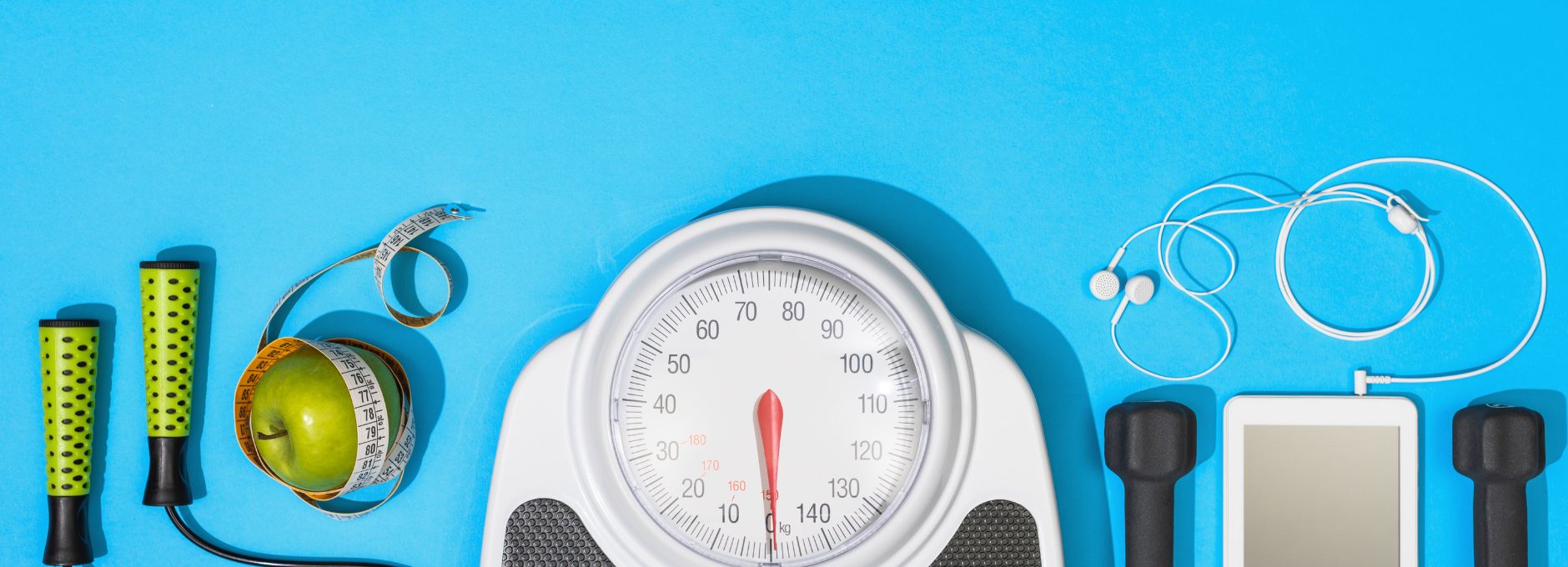Common Weight Loss Mistakes to Avoid

track your weight
Common Weight Loss Mistakes to Avoid
Feel like you’re doing all the right things, eating healthily and moving more, but aren’t seeing the weight loss results you want? Many of us have found ourselves in that exact same place. You might just be following misguided advice. Losing weight isn’t always easy, and there are some do’s and don’ts you should be aware of. Want to know how to do things right? Here are some common weight loss mistakes to avoid.

Weight loss mistakes to avoid
1. Eating too many calories
Estimating your daily calories can often mean you’re eating more than you realise. In order to lose weight, you need to burn more calories than you’re consuming. There are three main processes that burn calories:
- Basal metabolic rate (BMR) – the calories your body uses to maintain basic functions
- Digestion – Around 10–15% of the calories you eat is used to digest your food, known as the thermic effect of food (TEF)
- Physical activity – This includes workouts, plus everyday activities like walking and cleaning3
When you eat more calories than you burn, it leads to weight gain over time: a calorie deficit is needed to lose weight. Calorie counting is a useful tool to help you gain control over how much you’re eating. However, if done wrong, you might be eating more calories than you think, and this is among the most common weight loss mistakes around.
What should you do?
Keeping a food diary or tracking what you’re eating in an app can help you better estimate your calories and ensure you’re not eating too much.
Work out the amount of calories your body needs to maintain your weight (this will depend on age, sex, activity level, and other factors) and slightly reduce it. You can use a calculator to figure this out.
Remember, however, while weight loss depends on calories in vs. calories out, the quality of these calories also matters, and failing to recognise this is a common mistake during weight loss. The type of food you eat matters, so ensure you follow a healthy, balanced diet.
2. Eating too few calories
Eating too little is a common weight loss mistake. While a calorie deficit is needed for weight loss, significantly reducing your food intake can lead to muscle loss, which can slow down your metabolism.
A crash diet typically a very low-calorie diet, where you eat very restrictively for a short period of time4. It can be tempting to lose weight fast, but they carry a number of risks, such as:
- Fatigue
- Dehydration
- Irritability
- Constipation
- Weakened immune system
- Hair thinning
What’s more, it can be extremely difficult to maintain this weight loss, as restrictive ways of eating aren’t sustainable and are among the most common weight loss mistakes to make. Plus, muscle loss can slow down metabolism, meaning the weight goes on quicker, and can leave you heavier than when you started.
What should you do?
Maintain a moderate calorie deficit: nothing too drastic. A good rule of thumb for healthy weight loss is a deficit of about 500 calories per day, which should help you lose about 1 pound per week5. This should be achieved through eating slightly less and moving more.
3. Skipping strength training
Lifting weights is one of the most effective strategies for gaining muscle and increasing metabolic rate, but one that’s often overlooked or forgotten about. This can therefore help you lose weight. It also improves strength and physical function.
What should you do?
Incorporate strength training into your exercise routine, aiming for 2-3 times a week6. Mix it up also, don’t just work on the same muscles every time.
4. Focusing on the number on the scale alone
It’s not only the number on the scale that matters when it comes to weight loss. This is especially true if you’re lifting weights. Muscle is much more dense than body fat, and remembering this will help you avoid this common losing weight mistake. Therefore, a pound of muscle will take up much less room in your body than a pound of fat7.
What should you do?
You should also pay attention to how your clothes feel, and how you look in the mirror. While the number on the scale is important, it’s not the only thing that matters. If the number on the scale isn’t going down, it can be disheartening. But, you might still be losing fat without realising.
5. Not eating enough protein
Protein is the number one most important macronutrient when it comes to weight loss, as it’s been shown to help in a number of ways:
- Reduces appetite
- Suppresses hunger
- Promotes muscle growth
- Maintains or increases metabolic rate
Protein also has the highest thermic effect of food, meaning it burns more calories than carbs or fat when being digested8.
What should you do?
Get more protein into your diet and avoid this common weight loss mistake! Some sources include:
- Lean meat (e.g. turkey, chicken)
- Tofu
- Fish
- Edamame
6. Not exercising
Stepping foot in a gym or going for a run can be daunting if you’re not used to exercising. But, you should try and make it a habit and avoid this mistake during weight loss. Exercise can not only help you lose weight, by burning calories and growing muscle, but has other benefits too, including:
- Reduces your risk of major illnesses
- Cancer
- Type 2 diabetes
- Stroke
- Heart disease
- Boosts self-esteem
- Improves mood
- Reduces stress
- Improves sleep quality
What should you do?
Find an activity you love, and make it part of your weekly routine. Mix it up too if you find yourself getting bored easily, e.g. a long walk on one day, lifting weights on another, going for a run the next…
Aim for at least 150 minutes of moderate intensity activity a week, or 75 minutes of vigorous intensity activity a week9.
7. Drinking your calories
Sugary fruit juice, fizzy drinks and milkshakes can be calorie-laden and full of sugar, and therefore could be contributing to weight gain and form one of the most common weight loss mistakes. It’s easy to forget about calories in drinks as you’re not actually chewing anything, but that doesn’t mean they’re not there. Not only can these be high in calories, but they’re also less satiating, meaning they won’t fill you up as much as food will.
What should you do?
Make healthy swaps: a piece of fruit may be a better choice than fruit juice, as while both contain sugar, the piece of fruit will have more fibre and fill you up better. Reduce your intake of sugary drinks also, if you can.
8. Eating ‘diet’ foods
The packaging might brand something as a ‘diet’ product, so you may assume it’s healthier than other products on offer. While they might be low-fat, they can also be loaded with sugar to improve their flavour. What’s more, not eating enough fat can leave you feeling hungrier. Therefore, eating only low fat foods may mean you end up eating more food than your body needs.
What should you do?
Don’t be fooled by marketing gimmicks or labels and avoid this weight loss mistake by reading the ingredients list. Don’t completely eliminate fat from your diet either, as that can leave you feeling hungrier.
9. Not getting enough sleep
Research suggests that sleep restriction can lead to negative changes in metabolism. It also appears to increase hunger and appetite, particularly for calorie-dense foods10. This could be because sleep duration affects hormones regulating hunger: ghrelin and leptin, increasing the hunger hormone. Another contributing factor might be that lack of sleep leads to fatigue, making you less likely to exercise.
What should you do?
Try to get between 6 and 9 hours of sleep every night11. If you’re struggling to do so, some tips include:
- Blocking out all light and noise
- Practicing relaxation techniques
- Reducing stress
- Ensuring your bed is comfortable
- Keeping your room clean and tidy
10. Overestimating calories burnt during exercise
While exercise increases metabolic rate, it may not burn as many calories as you think. While exercising is crucial for overall health, workouts don’t give you a license to eat whatever you want.
What should you do?
Focus on the calories you’re consuming to avoid this weight loss mistake, ensure it’s not too much, even if you’re exercising.
11. Not eating enough fibre
High-fibre foods can keep you feeling full, helping you eat less, which is ideal for weight loss12. They can also promote gut health.
What should you do?
Avoid this common weight loss mistake by simply eating more fibre! Good sources include fruit and vegetables, brown rice and pasta, whole grains, beans and lentils.
12. Not being mindful
Not paying attention to your food and eating too fast can mean you eat more than you anticipated. This can slow down your weight loss1.
What should you do?
Practice mindful eating to gain control over your eating habits. It’s also been shown to promote weight loss, reduce binge eating, and help you feel better13. This involves:
- Eating slowly
- Eating without distraction
- Listening to hunger cues
- Only eating when you’re full
- Appreciating your food
- Noticing the effects food has on your body
13. Having unrealistic expectations
Is it possible your expectations are a little too high? You didn’t gain the weight overnight, so you can’t expect to lose it overnight either. You might be feeling like you’re not achieving the weight loss you want just because you haven’t dropped a dress size immediately.
What should you do?
Weight loss takes time, so be patient. Focus on building healthy habits that you can maintain for the long-term, such as exercising regularly and eating more fruit and veg. Losing 1–2 pounds (0.45–0.9 kg) per week is considered a healthy and safe rate of weight loss14.
14. Not reading labels
Too many of us are unsure of what we’re eating and what goes into our food. Read the label closely – how much sugar is in there? How much fat? What about salt? How many calories does it have? You should also pay attention to serving sizes, sometimes within a packet, the recommended serving size is for two – not one.
What should you do?
This one is a simple weight loss mistake to avoid: read the label closely. Make sure you have a good understanding of what you’re eating and what’s going into your food.
15. Not exercising portion control
Even healthy food can be high in calories sometimes, such as peanut butter, dark chocolate and avocados. Overeating on calorie-dense foods could prevent you from reaching your goals.
What should you do?
Ensure you are exercising portion control at all times. Be aware of what you’re eating, and how much – write it down if you have to. Also, pause before you go for that second helping – it takes time for your brain to register you’re full!
16. Eating too few whole foods
A diet full of heavily processed foods could be a barrier to weight loss, as they’re easier to over consume and often offer less nutritional value.
What should you do?
Eat as many whole foods as possible2, such as fruits and vegetables, and make them form the basis of your diet. Reduce your intake of heavily processed, high-fat, high-sugar options like cakes and biscuits.

Weight loss can be challenge
A weight loss journey can be difficult, full of ups and downs. But, essentially, you should focus on eating a healthy, balanced diet and moving more—this will help you avoid the most common weight loss mistakes. You don’t have to overly restrict or aim for a ‘perfect’ diet: there’s no such thing. Your favourite treats can fit in too. Try to enjoy yourself, focusing on everything you’re gaining rather than what you’re taking away.